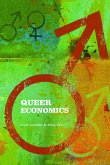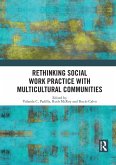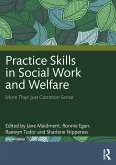Gerald P Mallon (USA Hunter College)
Foundations of Social Work Practice with Lesbian and Gay Persons
Gerald P Mallon (USA Hunter College)
Foundations of Social Work Practice with Lesbian and Gay Persons
- Broschiertes Buch
- Merkliste
- Auf die Merkliste
- Bewerten Bewerten
- Teilen
- Produkt teilen
- Produkterinnerung
- Produkterinnerung
Focusing on the pragmatic aspects of social work with gay and lesbian persons, this book offers a knowledge base of practice that enables prepare students and practitioners for working more competently and effectively with lesbians and gay men. It teaches you how to develop practice approaches that are sensitive to issues of sexual orientation.
Andere Kunden interessierten sich auch für
![Social Work Practice with LGBTQIA Populations Social Work Practice with LGBTQIA Populations]() Social Work Practice with LGBTQIA Populations76,99 €
Social Work Practice with LGBTQIA Populations76,99 €![Queer Economics Queer Economics]() Joyce Jacobsen / Adam Zeller (eds.)Queer Economics73,99 €
Joyce Jacobsen / Adam Zeller (eds.)Queer Economics73,99 €![Rethinking Social Work Practice with Multicultural Communities Rethinking Social Work Practice with Multicultural Communities]() Rethinking Social Work Practice with Multicultural Communities57,99 €
Rethinking Social Work Practice with Multicultural Communities57,99 €![Men Who Beat the Men Who Love Them Men Who Beat the Men Who Love Them]() Patrick LetellierMen Who Beat the Men Who Love Them48,99 €
Patrick LetellierMen Who Beat the Men Who Love Them48,99 €![Practice Skills in Social Work and Welfare Practice Skills in Social Work and Welfare]() Practice Skills in Social Work and Welfare53,99 €
Practice Skills in Social Work and Welfare53,99 €![Social Work Practice in Mental Health Social Work Practice in Mental Health]() Robert BlandSocial Work Practice in Mental Health57,99 €
Robert BlandSocial Work Practice in Mental Health57,99 €![Art in Social Work Practice Art in Social Work Practice]() Art in Social Work Practice61,99 €
Art in Social Work Practice61,99 €-
-
-
Focusing on the pragmatic aspects of social work with gay and lesbian persons, this book offers a knowledge base of practice that enables prepare students and practitioners for working more competently and effectively with lesbians and gay men. It teaches you how to develop practice approaches that are sensitive to issues of sexual orientation.
Hinweis: Dieser Artikel kann nur an eine deutsche Lieferadresse ausgeliefert werden.
Hinweis: Dieser Artikel kann nur an eine deutsche Lieferadresse ausgeliefert werden.
Produktdetails
- Produktdetails
- Verlag: Taylor & Francis Inc
- Seitenzahl: 316
- Erscheinungstermin: 18. Dezember 1997
- Englisch
- Abmessung: 214mm x 154mm x 21mm
- Gewicht: 440g
- ISBN-13: 9781560231011
- ISBN-10: 1560231017
- Artikelnr.: 21552566
- Herstellerkennzeichnung
- Libri GmbH
- Europaallee 1
- 36244 Bad Hersfeld
- gpsr@libri.de
- Verlag: Taylor & Francis Inc
- Seitenzahl: 316
- Erscheinungstermin: 18. Dezember 1997
- Englisch
- Abmessung: 214mm x 154mm x 21mm
- Gewicht: 440g
- ISBN-13: 9781560231011
- ISBN-10: 1560231017
- Artikelnr.: 21552566
- Herstellerkennzeichnung
- Libri GmbH
- Europaallee 1
- 36244 Bad Hersfeld
- gpsr@libri.de
Gerald P. Mallon, DSW, is Assistant Professor in the School of Social Work at Columbia University. His research interests focus on the experiences of gay and lesbian children, youth, and families within the context of child welfare service delivery.
Contents
About the Editor
* Contributors
* Foreword
* Acknowledgments
* Chapter 1: Knowledge for Practice with Gay and Lesbian Persons
* An Ecological Approach
* Sources of Knowledge
* Practice Wisdom
* Personal Experience
* History and Current Events
* The Professional Literature
* Research
* Theoretical and Conceptual Analyses
* Self-Awareness
* Knowledge Derived from the Individual Case
* Conclusion
* Chapter 2: Values and Ethics in Social Work Practice with Lesbian and
Gay Persons
* The Profession's Core Values and Ethical Principles: Application in
Practice with Lesbian and Gay Clients
* Identifying, Analyzing, and Resolving Ethically Challenging Practice
Problems and Dilemmas
* Conclusion
* Chapter 3: Negotiating Conflicts in Allegiances Among Lesbians and
Gays of Color: Reconciling Divided Selves and Communities
* Previous Research on Racial Identity, Gay/Lesbian Identity, and GALOC
Identity
* Applying the Life Model: The Stress-Coping Process Revisited
* Paradigm of the Stress Process
* Heterosexism, Racism, and Sexism: Creating Conflicts in Allegiances
* The Root of Conflicts in Allegiances: Pressures for Unity via
Homogeneity
* Conclusion
* Chapter 4: Individual Practice with Gay Men
* Introduction
* Definition
* Assessment
* Ethnic and Cultural Diversity
* Rural Gay Men
* Depression and Development Issues
* Chronically Mentally Ill Gay Men
* Substance Abuse
* Domestic Violence
* Antigay Violence
* Aging
* AIDS
* HIV-Negative Men
* Living with HIV and AIDS
* Death and Dying
* Conclusion
* Chapter 5: Individual Practice with Lesbians
* Who Is Your Client?
* Married Lesbians
* Adolescents
* Gender Bias
* Couples
* Domestic Violence
* Lesbian Mothers, Children, and Families
* Lesbians of Color
* Differently Abled Lesbians
* Rural Lesbians
* Case Vignette
* Health
* HIV/AIDS
* Alcohol and Substance Abuse
* Older Lesbians
* Religion
* Conclusion
* Chapter 6: Group Work Practice with Gay Men and Lesbians
* Societal Context
* Merits of Group Work
* Literature Review
* A Group Work Approach
* Case Illustrations
* Discussion
* Chapter 7: Social Work Practice with Gay Men and Lesbians Within
Families
* Definition of Family
* An Ecological Perspective
* Gays and Lesbians in the Context of Their Families of Origin
* Disclosure to Families of Origin
* Disclosure to Parents
* Creating Families
* Conclusion
* Chapter 8: Social Work Practice with Lesbian Couples
* Fusion and Enmeshment: Strength or Pathology?
* Influence of Same-Gender Socialization
* The Impact of a Nonnutritive Environment: Homophobia and Social
Exclusion
* Internalized Homophobia
* Lesbian Identity Development and Couplehood
* Sexual Intimacy Issues
* Fusion and Enmeshment as Functional and Adaptive: High Emotional
Closeness
* Fusion as Pathology
* Therapist-Specific Issues
* In Summary: Therapeutic Goals and Interventions
* Conclusion
* Chapter 9: Social Work Practice with Gay Male Couples
* Internalized Homphobia, Heterosexism, and Gay Identity
* Coupling Dynamics
* Male Gender Role Socialization
* Joining
* Assessing Presenting Concerns
* Interventions
* Case Illustrations
* Implications for Social Work Practice
* Conclusion
* Chapter 10: Social Work Practice with Gay Men and Lesbians Within
Communities
* Practice with Communities Within an Ecological Framework
* Disempowerment and Social Pollution
* The Search for Community Within the Context of the Coming-Out Process
* Habitat
* Niche
* The Transgendered Community
* Implications for Social Work Practice
* Chapter 11: Social Work Practice with Gay Men and Lesbians Within
Organizations
* Code of Ethics
* Organizational and Political Realities
* Contemporary Practice
* Strategies
About the Editor
* Contributors
* Foreword
* Acknowledgments
* Chapter 1: Knowledge for Practice with Gay and Lesbian Persons
* An Ecological Approach
* Sources of Knowledge
* Practice Wisdom
* Personal Experience
* History and Current Events
* The Professional Literature
* Research
* Theoretical and Conceptual Analyses
* Self-Awareness
* Knowledge Derived from the Individual Case
* Conclusion
* Chapter 2: Values and Ethics in Social Work Practice with Lesbian and
Gay Persons
* The Profession's Core Values and Ethical Principles: Application in
Practice with Lesbian and Gay Clients
* Identifying, Analyzing, and Resolving Ethically Challenging Practice
Problems and Dilemmas
* Conclusion
* Chapter 3: Negotiating Conflicts in Allegiances Among Lesbians and
Gays of Color: Reconciling Divided Selves and Communities
* Previous Research on Racial Identity, Gay/Lesbian Identity, and GALOC
Identity
* Applying the Life Model: The Stress-Coping Process Revisited
* Paradigm of the Stress Process
* Heterosexism, Racism, and Sexism: Creating Conflicts in Allegiances
* The Root of Conflicts in Allegiances: Pressures for Unity via
Homogeneity
* Conclusion
* Chapter 4: Individual Practice with Gay Men
* Introduction
* Definition
* Assessment
* Ethnic and Cultural Diversity
* Rural Gay Men
* Depression and Development Issues
* Chronically Mentally Ill Gay Men
* Substance Abuse
* Domestic Violence
* Antigay Violence
* Aging
* AIDS
* HIV-Negative Men
* Living with HIV and AIDS
* Death and Dying
* Conclusion
* Chapter 5: Individual Practice with Lesbians
* Who Is Your Client?
* Married Lesbians
* Adolescents
* Gender Bias
* Couples
* Domestic Violence
* Lesbian Mothers, Children, and Families
* Lesbians of Color
* Differently Abled Lesbians
* Rural Lesbians
* Case Vignette
* Health
* HIV/AIDS
* Alcohol and Substance Abuse
* Older Lesbians
* Religion
* Conclusion
* Chapter 6: Group Work Practice with Gay Men and Lesbians
* Societal Context
* Merits of Group Work
* Literature Review
* A Group Work Approach
* Case Illustrations
* Discussion
* Chapter 7: Social Work Practice with Gay Men and Lesbians Within
Families
* Definition of Family
* An Ecological Perspective
* Gays and Lesbians in the Context of Their Families of Origin
* Disclosure to Families of Origin
* Disclosure to Parents
* Creating Families
* Conclusion
* Chapter 8: Social Work Practice with Lesbian Couples
* Fusion and Enmeshment: Strength or Pathology?
* Influence of Same-Gender Socialization
* The Impact of a Nonnutritive Environment: Homophobia and Social
Exclusion
* Internalized Homophobia
* Lesbian Identity Development and Couplehood
* Sexual Intimacy Issues
* Fusion and Enmeshment as Functional and Adaptive: High Emotional
Closeness
* Fusion as Pathology
* Therapist-Specific Issues
* In Summary: Therapeutic Goals and Interventions
* Conclusion
* Chapter 9: Social Work Practice with Gay Male Couples
* Internalized Homphobia, Heterosexism, and Gay Identity
* Coupling Dynamics
* Male Gender Role Socialization
* Joining
* Assessing Presenting Concerns
* Interventions
* Case Illustrations
* Implications for Social Work Practice
* Conclusion
* Chapter 10: Social Work Practice with Gay Men and Lesbians Within
Communities
* Practice with Communities Within an Ecological Framework
* Disempowerment and Social Pollution
* The Search for Community Within the Context of the Coming-Out Process
* Habitat
* Niche
* The Transgendered Community
* Implications for Social Work Practice
* Chapter 11: Social Work Practice with Gay Men and Lesbians Within
Organizations
* Code of Ethics
* Organizational and Political Realities
* Contemporary Practice
* Strategies
Contents
About the Editor
* Contributors
* Foreword
* Acknowledgments
* Chapter 1: Knowledge for Practice with Gay and Lesbian Persons
* An Ecological Approach
* Sources of Knowledge
* Practice Wisdom
* Personal Experience
* History and Current Events
* The Professional Literature
* Research
* Theoretical and Conceptual Analyses
* Self-Awareness
* Knowledge Derived from the Individual Case
* Conclusion
* Chapter 2: Values and Ethics in Social Work Practice with Lesbian and
Gay Persons
* The Profession's Core Values and Ethical Principles: Application in
Practice with Lesbian and Gay Clients
* Identifying, Analyzing, and Resolving Ethically Challenging Practice
Problems and Dilemmas
* Conclusion
* Chapter 3: Negotiating Conflicts in Allegiances Among Lesbians and
Gays of Color: Reconciling Divided Selves and Communities
* Previous Research on Racial Identity, Gay/Lesbian Identity, and GALOC
Identity
* Applying the Life Model: The Stress-Coping Process Revisited
* Paradigm of the Stress Process
* Heterosexism, Racism, and Sexism: Creating Conflicts in Allegiances
* The Root of Conflicts in Allegiances: Pressures for Unity via
Homogeneity
* Conclusion
* Chapter 4: Individual Practice with Gay Men
* Introduction
* Definition
* Assessment
* Ethnic and Cultural Diversity
* Rural Gay Men
* Depression and Development Issues
* Chronically Mentally Ill Gay Men
* Substance Abuse
* Domestic Violence
* Antigay Violence
* Aging
* AIDS
* HIV-Negative Men
* Living with HIV and AIDS
* Death and Dying
* Conclusion
* Chapter 5: Individual Practice with Lesbians
* Who Is Your Client?
* Married Lesbians
* Adolescents
* Gender Bias
* Couples
* Domestic Violence
* Lesbian Mothers, Children, and Families
* Lesbians of Color
* Differently Abled Lesbians
* Rural Lesbians
* Case Vignette
* Health
* HIV/AIDS
* Alcohol and Substance Abuse
* Older Lesbians
* Religion
* Conclusion
* Chapter 6: Group Work Practice with Gay Men and Lesbians
* Societal Context
* Merits of Group Work
* Literature Review
* A Group Work Approach
* Case Illustrations
* Discussion
* Chapter 7: Social Work Practice with Gay Men and Lesbians Within
Families
* Definition of Family
* An Ecological Perspective
* Gays and Lesbians in the Context of Their Families of Origin
* Disclosure to Families of Origin
* Disclosure to Parents
* Creating Families
* Conclusion
* Chapter 8: Social Work Practice with Lesbian Couples
* Fusion and Enmeshment: Strength or Pathology?
* Influence of Same-Gender Socialization
* The Impact of a Nonnutritive Environment: Homophobia and Social
Exclusion
* Internalized Homophobia
* Lesbian Identity Development and Couplehood
* Sexual Intimacy Issues
* Fusion and Enmeshment as Functional and Adaptive: High Emotional
Closeness
* Fusion as Pathology
* Therapist-Specific Issues
* In Summary: Therapeutic Goals and Interventions
* Conclusion
* Chapter 9: Social Work Practice with Gay Male Couples
* Internalized Homphobia, Heterosexism, and Gay Identity
* Coupling Dynamics
* Male Gender Role Socialization
* Joining
* Assessing Presenting Concerns
* Interventions
* Case Illustrations
* Implications for Social Work Practice
* Conclusion
* Chapter 10: Social Work Practice with Gay Men and Lesbians Within
Communities
* Practice with Communities Within an Ecological Framework
* Disempowerment and Social Pollution
* The Search for Community Within the Context of the Coming-Out Process
* Habitat
* Niche
* The Transgendered Community
* Implications for Social Work Practice
* Chapter 11: Social Work Practice with Gay Men and Lesbians Within
Organizations
* Code of Ethics
* Organizational and Political Realities
* Contemporary Practice
* Strategies
About the Editor
* Contributors
* Foreword
* Acknowledgments
* Chapter 1: Knowledge for Practice with Gay and Lesbian Persons
* An Ecological Approach
* Sources of Knowledge
* Practice Wisdom
* Personal Experience
* History and Current Events
* The Professional Literature
* Research
* Theoretical and Conceptual Analyses
* Self-Awareness
* Knowledge Derived from the Individual Case
* Conclusion
* Chapter 2: Values and Ethics in Social Work Practice with Lesbian and
Gay Persons
* The Profession's Core Values and Ethical Principles: Application in
Practice with Lesbian and Gay Clients
* Identifying, Analyzing, and Resolving Ethically Challenging Practice
Problems and Dilemmas
* Conclusion
* Chapter 3: Negotiating Conflicts in Allegiances Among Lesbians and
Gays of Color: Reconciling Divided Selves and Communities
* Previous Research on Racial Identity, Gay/Lesbian Identity, and GALOC
Identity
* Applying the Life Model: The Stress-Coping Process Revisited
* Paradigm of the Stress Process
* Heterosexism, Racism, and Sexism: Creating Conflicts in Allegiances
* The Root of Conflicts in Allegiances: Pressures for Unity via
Homogeneity
* Conclusion
* Chapter 4: Individual Practice with Gay Men
* Introduction
* Definition
* Assessment
* Ethnic and Cultural Diversity
* Rural Gay Men
* Depression and Development Issues
* Chronically Mentally Ill Gay Men
* Substance Abuse
* Domestic Violence
* Antigay Violence
* Aging
* AIDS
* HIV-Negative Men
* Living with HIV and AIDS
* Death and Dying
* Conclusion
* Chapter 5: Individual Practice with Lesbians
* Who Is Your Client?
* Married Lesbians
* Adolescents
* Gender Bias
* Couples
* Domestic Violence
* Lesbian Mothers, Children, and Families
* Lesbians of Color
* Differently Abled Lesbians
* Rural Lesbians
* Case Vignette
* Health
* HIV/AIDS
* Alcohol and Substance Abuse
* Older Lesbians
* Religion
* Conclusion
* Chapter 6: Group Work Practice with Gay Men and Lesbians
* Societal Context
* Merits of Group Work
* Literature Review
* A Group Work Approach
* Case Illustrations
* Discussion
* Chapter 7: Social Work Practice with Gay Men and Lesbians Within
Families
* Definition of Family
* An Ecological Perspective
* Gays and Lesbians in the Context of Their Families of Origin
* Disclosure to Families of Origin
* Disclosure to Parents
* Creating Families
* Conclusion
* Chapter 8: Social Work Practice with Lesbian Couples
* Fusion and Enmeshment: Strength or Pathology?
* Influence of Same-Gender Socialization
* The Impact of a Nonnutritive Environment: Homophobia and Social
Exclusion
* Internalized Homophobia
* Lesbian Identity Development and Couplehood
* Sexual Intimacy Issues
* Fusion and Enmeshment as Functional and Adaptive: High Emotional
Closeness
* Fusion as Pathology
* Therapist-Specific Issues
* In Summary: Therapeutic Goals and Interventions
* Conclusion
* Chapter 9: Social Work Practice with Gay Male Couples
* Internalized Homphobia, Heterosexism, and Gay Identity
* Coupling Dynamics
* Male Gender Role Socialization
* Joining
* Assessing Presenting Concerns
* Interventions
* Case Illustrations
* Implications for Social Work Practice
* Conclusion
* Chapter 10: Social Work Practice with Gay Men and Lesbians Within
Communities
* Practice with Communities Within an Ecological Framework
* Disempowerment and Social Pollution
* The Search for Community Within the Context of the Coming-Out Process
* Habitat
* Niche
* The Transgendered Community
* Implications for Social Work Practice
* Chapter 11: Social Work Practice with Gay Men and Lesbians Within
Organizations
* Code of Ethics
* Organizational and Political Realities
* Contemporary Practice
* Strategies








